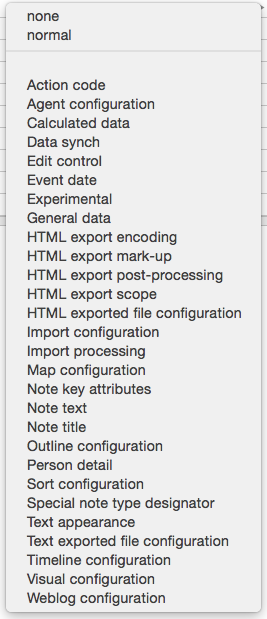
This menu for String, List and Set key attributes allows you to pick any already-used string [sic] attribute value from a list when that attribute is displayed as a Key Attribute in a text window. The list is created dynamically and is only shown for String, Set and List data type attributes (unless they are built-in read-only fields). The list is case sensitive - so 'Big' and 'big' would both be included as separate values.
For list and set type attributes, the list shows all discrete values not just the values for the current note. For sets and lists only, clicking a listed value toggles it - the value is added unless the desired attribute already has that value, in which case it is deleted.
The 'normal' value listed separately at the top of the menu resets the default value for that attribute (or set).
As attribute values are stored case-sensitively, use an agent to help hunt down notes with incorrect spelling/case for values. Use the == equality operator for the query as this is inherently case-sensitive. Using .contains() you need to explicitly set case sensitivity although it is 'on' by default - or use .icontains().
Individual listed values are truncated at 31 characters. Values longer than that must be entered manually. Value listings can be as long as 255 characters.
There is a limit to the number of values for which a list will be created; the current default is 999. Where this value is exceeded, the pop-up shows the first 999 values (assumed to computed from reading notes in $OutlineOrder).
In the rare context, such as very large projects, constrained by the default list size limit, it is possible to set a higher limit by using a custom config.xml with a new
There is an option for the user to alter this value (higher or lower) by editing their Tinderbox config.xml file and changing the 'UniqueValueLimit' parameter. Before altering this value do consider that setting a much higher limit may affect the applications performance on less powerful machines, especially if several fields with large lists as set a key attributes in note text windows.
Set-type attributes show a tick against all values set for the current note.
The pop-up value lists are sorted case-insensitively.
